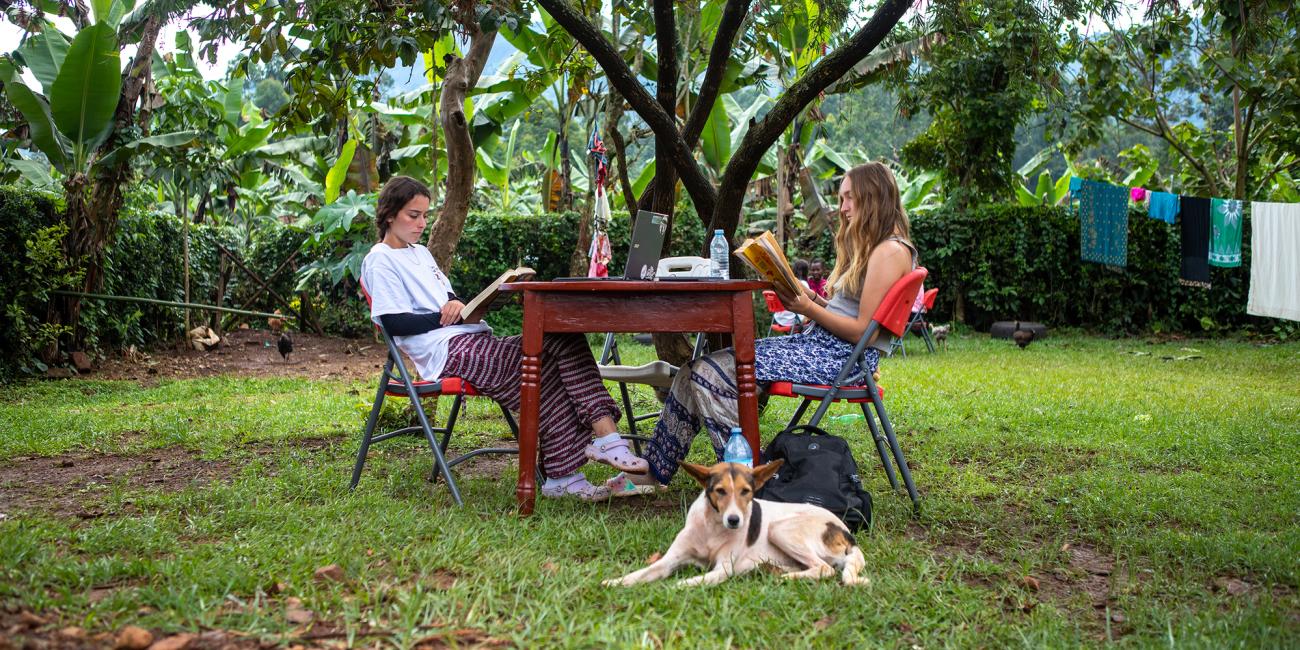Crucial Conversations
Environmental Policy Student Examines Impact of Conservation in Uganda
Margaux Petruska ’21 '23G, a student in the Environmental Policy program, spent four weeks in eastern Uganda in summer 2022. Clad in a long skirt in the summer heat, Petruska worked with a translator interviewing farmers and government officials. Her research project— Conservation Complexities in the Mount Elgon Region of Uganda—examines the challenges that conservation efforts pose to farmers trying to eke out a living. It is the basis of her master’s degree thesis.
The natural beauty of Mount Elgon National Park in Uganda’s Bududa region contrasts sharply with the challenges faced by the people living there: poverty, dangerous landslides, lack of medical care and limited educational resources.
“Being there is different than reading about it in a book or in movies I’ve watched for class,” says Petruska, who is from Emmaus, Pa. “There are none of the normal comforts that we are used to. It’s mostly subsistence living.”
Petruska conducted her research while participating in a summer program run by Kelly Austin, professor of sociology and associate dean of undergraduate programs, and Mark Noble, visiting assistant professor of sociology. Working with Pathways Development Initiative (PDI), a non-governmental organization that works to improve education, health care and economic opportunity, Austin has taken Lehigh students to Uganda for internships and research experiences since 2012.
Austin is a member of PDI’s board of directors. The summer program is experiential and not done for academic credit. All students receive full funding from Lehigh for the experience. Petruska received a Summer Environmental Fellowship from the College of Arts and Sciences Environmental Initiative to cover her expenses.

Petruska earned her bachelor’s degree, with a dual major in global studies and political science and a minor in environmental studies, from Lehigh in 2021. She was originally supposed to attend the Uganda program in summer 2020. Because the program was suspended in both 2020 and 2021 due to the COVID-19 pandemic, she was permitted to attend as a graduate student.
Petruska and other Lehigh students lived at the Zaale Homestay with PDI founders David and Elizabeth Zaale and PDI team members. Limited access to electricity and internet—most power is generated using solar panels—meant a summer unplugging from cellphones.
“I really appreciated the time to appreciate what’s around me and just go on walks and hike rather than just be on my phone scrolling. I loved it,” Petruska says.
Before going to Uganda, Petruska thought her research would focus on how government conservation efforts were impacting coffee growing, Uganda’s primary export and the area’s most lucrative crop. After her first interviews with farmers, local officials and conservation specialists, her project took on a broader focus. Because 90 percent of the population is engaged in subsistence agriculture, in which food is grown to meet basic food needs, examining the impact of conservation policies on that type of farming also made sense.
Working with Dez Zaale, the youngest son of PDI’s founders, as her interpreter, Petruska conducted most interviews in “man on the street” fashion, stopping people in the small trading centers and asking to interview them. Her only scheduled interviews were with officials. The openness of the people was a hallmark of her experience.
“They’re very welcoming and friendly,” she says.
A key issue examined in her research concerns farmers whose land overlaps the boundaries of Mount Elgon National Park. At one time, penalties were not enforced for farmlands that encroached park territory. Stricter policies to help curb deforestation and erosion have changed that. Now farmers are expected to file a Memorandum of Understanding (MOU) to get official permission to use the park land. The research is showing a disconnect between the two sides. Officials interviewed described the MOU as easy to obtain. Petruska’s research shows that for poor farmers living on $1 a day, traveling the 21 miles to Mbale, the nearest city, to file the MOU with the Uganda Wildlife Authority is a hardship.
Some residents shared stories of beatings and punishments if they were caught violating the park boundaries. They also formerly were permitted park access to gather firewood and herbs.
Both residents and officials interviewed appear to have a mutual understanding that conservation efforts are important, Petruska said. Deforestation and accompanying soil erosion contribute to the devastating landslides that have marked the region. So does the almost daily rainfall that has become markedly heavier with climate change.
“I was having conversations with people who might not have education, who may not be mentioning climate change, but they are seeing the impacts of climate change affecting their lives every day,” Petruska says. “Generally, when I asked about conservation, every one of them thought it was important. They’ve seen the change in the weather. It’s right in front of their eyes.”
Austin praised the enthusiasm and commitment Petruska brought to her project.
“She’s driven, she’s curious. And she has an open mind. That’s the best set of qualities for a student embarking on this type of project,” Austin says. “Margaux took the initiative and was always up early, ready to get out there. She was willing to hike to the highest peak to get to a village and an area of the district that she hadn't been to before.”
After graduating with her master’s in May 2023, Petruska will apply for jobs in research or policy work with environmental advocacy organizations. She also plans to return to Uganda in summer 2023 to be a program leader in Lehigh’s program with PDI and to work on a new project related to ecotourism. A new trail is opening that could be developed into a highly desirable hiking trail in the Mount Elgon region. The area’s natural beauty could be leveraged to draw more tourists, bringing economic benefit while sustaining the environment. She is eager to share what she has found there and promote positive interest in the region.
“The beauty of it is insane,” she says. “I’ve never seen any place like it. It is the most beautiful place I’ve ever been.”

